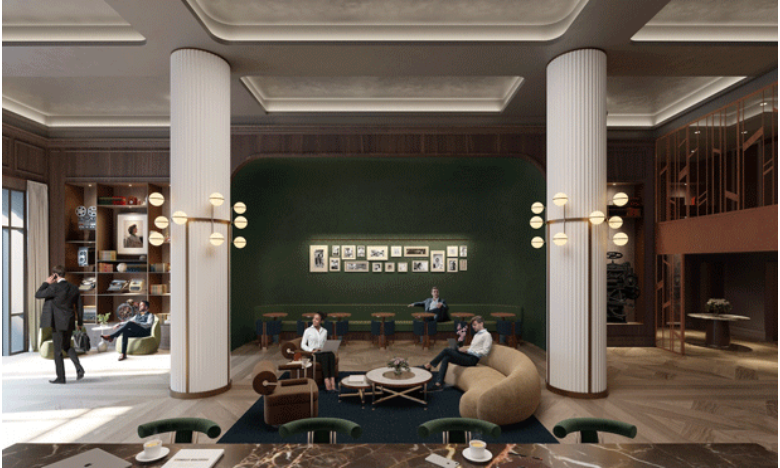Signature Smell, Branded Towels, Jackie O: Marx Realty Betting $40M It Can Lure Tenants To Its Vacant Downtown Building

February 17, 2021 Jon Banister, Bisnow Washington, D.C.
With office vacancy rates at all-time highs, leasing demand stagnant and the future of the workplace still uncertain, today might not seem like the best time to put tens of millions of dollars into renovating a vacant D.C. office building. But that isn’t stopping Marx Realty.

Marx Realty CEO Craig Deitelzweig in front of the office building at 1307 New York Ave. NW, which his firm is renovating.
The New York-based investor acquired The Herald office building at 1307 New York Ave. NW for $42M in April, a deal that had been under contract before the coronavirus pandemic began. The crisis hasn’t deterred Marx from pursuing an ambitious renovation effort, investing another $41.5M to overhaul the 134K SF office building.
“Even though there’s supply here, there’s a lot of supply of commodity product, there’s zero supply of product that we deliver,” Marx Realty CEO Craig Deitelzweig told Bisnow. “There’s no other building that has these ceiling heights, no other building that has this heritage, no other building that has the hospitality-infused office that we offer.”
The building became fully vacant in December when the group of associations that previously owned it moved out following a short-term leaseback arrangement. The developer is working with JLL‘s Evan Behr, Doug Mueller, Nathan Beach, Kristen Mathis and Emily Balkam to lease the building.
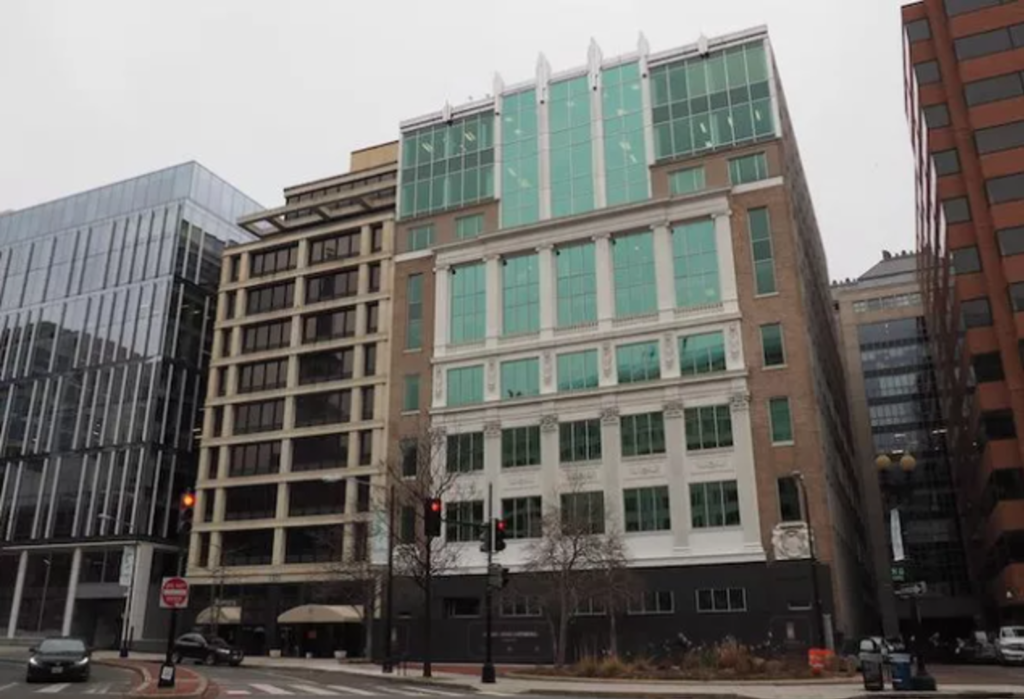
The office building at 1307 New York Ave. NW, branded as The Herald.
The team hasn’t closed any lease deals yet, but Deitelzweig said it has experienced strong touring activity and has received at least six lease proposals from tenants. He said the team was preparing for a tour with a prospective two-floor tenant Friday afternoon, after showing Bisnow around the under-construction property, which is sheathed at the ground level with wood fencing stamped with the slogan “A Sensory Office Experience, Coming Soon.”
“We have confidence because we’re seeing the tenants,” Deitelzweig said. “Tenants are touring the building. They’re asking for proposals. They’re the best tenants that any building could desire. They’re name-brand tenants. The rent proposals that are coming in are actually higher than our initial underwriting.”
The office spaces are scheduled to be ready for occupancy by May, and Deitelzweig expects to have at least one tenant signed on by then. He said the building has garnered interest from financial firms, tech companies, media organizations, law firms and government affairs offices.
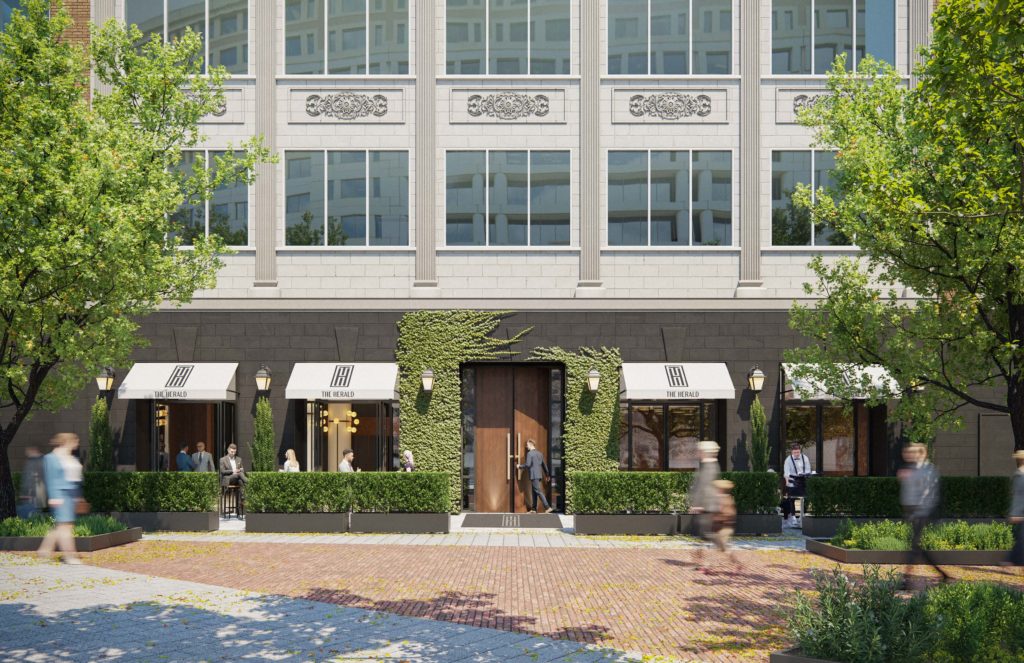
A rendering of the renovated entrance to The Herald office building.
Deitelzweig said there was a noticeable spike in government-related activity following the November election. Office market experts have been expecting the change in administration and unified federal government could lead to a bump in D.C. office demand.
“We saw it immediately after the election,” he said. “Literally that next week we had people knocking on our doors for government affairs offices. Some were making switches and they wanted new space, some were thinking of growth, and some were looking at the type of spending that’s going to be happening in D.C. and knowing they need to step up their game.”
The building’s asking rents are in the $60 per SF to $74 per SF range. Deitelzweig said it is offering concessions including tenant improvement allowances and a period of free rent to compete in today’s tenant-favorable market.
But ultimately he believes it won’t be the concessions, but the quality of the building that will help Marx Realty win over tenants.
Built in 1923, the Beaux Arts-style building is the former home of the Washington Herald Examiner. Jacqueline Kennedy Onassis, who was then Jacqueline Bouvier, worked in the building as a photographer and reporter for the newspaper.
The renovation pays tribute to the former first lady with the Bouvier Club, an 8,800 SF lounge just inside the entrance to the building featuring a fireplace and bookcase with walnut and copper finishes. The walls are lined with historical photographs, artwork and newspaper printing memorabilia.
The building’s first floor, with 22-foot ceiling heights, also features a European-style café, a 40-seat boardroom and a 5K SF office space with its own building entrance. The renovation was designed by Studios Architecture‘s David Burns, who also worked with Marx Realty on the renovations of 10 Grand Central and 545 Madison Ave. in Manhattan.
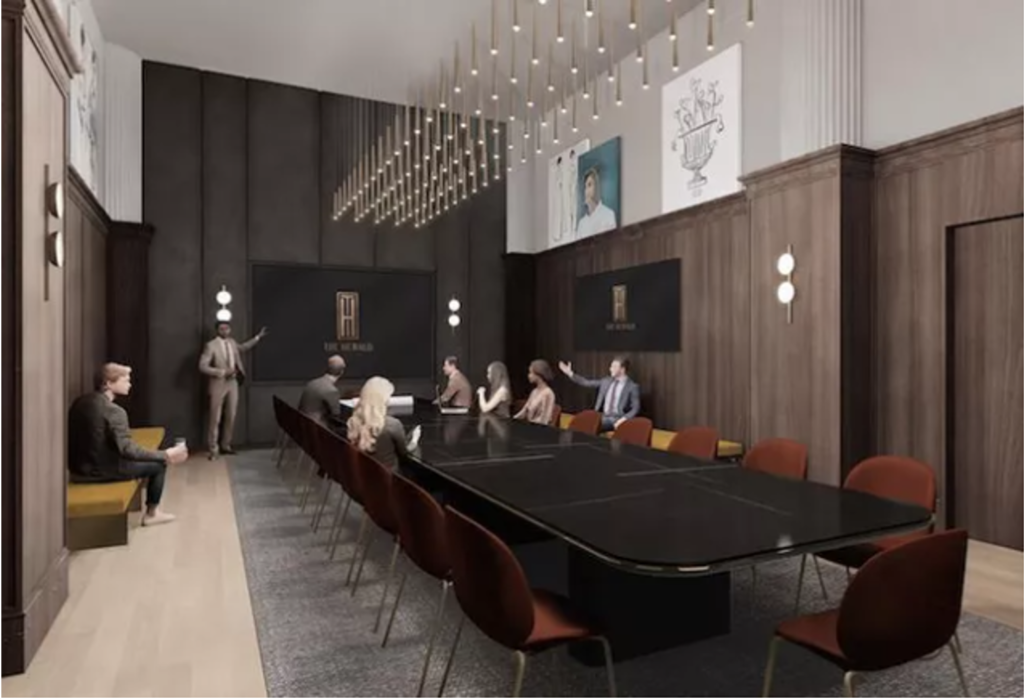
A rendering of the boardroom at Marx Realty’s office building, The Herald.
As part of its strategy to infuse hospitality elements into its office buildings, Marx Realty will have a doorman outside the large wooden entry doors, and it will have a signature scent in the common area.
In front of the building, at the intersection of New York Avenue and H Street NW, sits a small pocket park that Deitelzweig said it plans to work with the National Park Service to beautify.
The owner has also created a mobile application using its own Marx Connect software that will allow the building’s occupants to complete a health survey before entering, register guests, reserve conference space, arrange valet service and order salad deliveries through the Sweetgreen Outpost service.
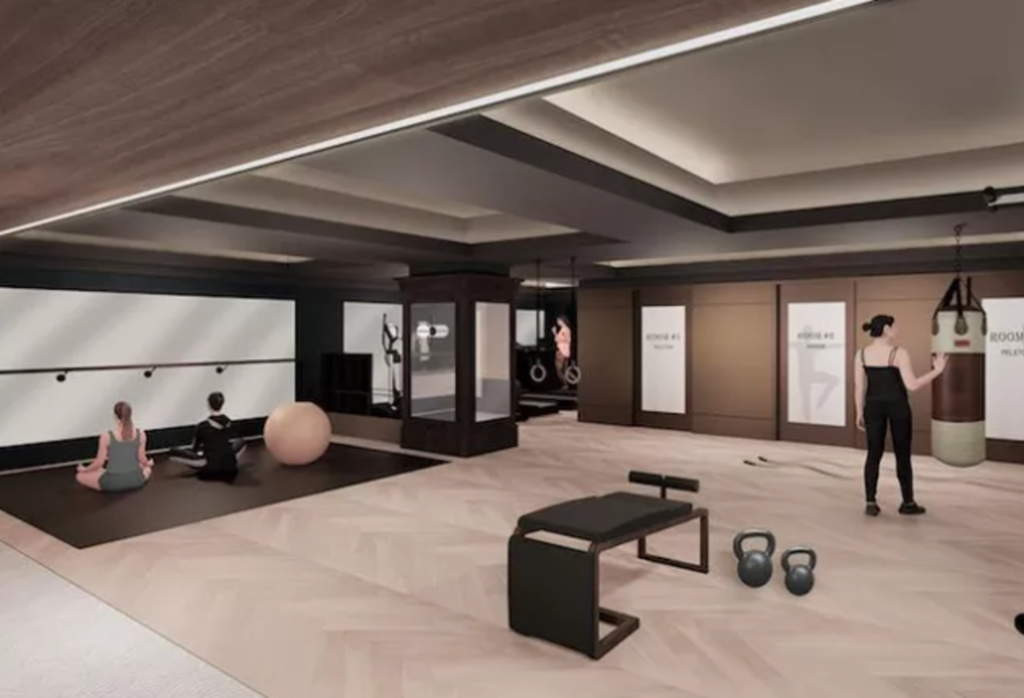
A rendering of the fitness center at The Herald office building.
The 7K SF fitness center features boxing equipment and private workout rooms with Peloton bikes and smart-glass mirrors that play workout instruction videos. It also has locker rooms with Herald-branded towels.
The office spaces throughout the building have ceilings heights between 13 and 15 feet, much higher than the standard office ceiling height of roughly 9 feet. On the seventh floor, the owner is creating pre-built suites with conference rooms and a café.
Marx Realty, which owns four buildings in D.C. and five in Northern Virginia, is continuing to search the market for new acquisition opportunities, Deitelzweig said. He said its ability to lease up the Herald building will factor into its timing for making another investment, and it also wants to make sure it finds the right type of building.
“We don’t want a commodity asset. We think those commodity assets are toast,” he said. “We really want a building that has the bones and the infrastructure to be really special. We love buildings with heritage and with these types of ceiling heights, but they’re hard to find.”
